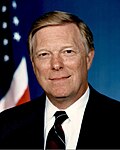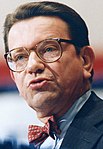
The 1988 United States presidential election was the 51st quadrennial presidential election held on Tuesday, November 8, 1988. The Republican nominee, incumbent Vice President George H. W. Bush, defeated the Democratic nominee, Governor Michael Dukakis of Massachusetts.

Richard Andrew Gephardt is an American attorney, lobbyist, and politician who represented Missouri's 3rd congressional district in the United States House of Representatives from 1977 to 2005. A member of the Democratic Party, he was House majority leader from 1989 to 1995 and minority leader from 1995 to 2003. He ran unsuccessfully for the Democratic nomination for President of the United States in 1988 and 2004. Gephardt was mentioned as a possible vice presidential nominee in 1988, 1992, 2000, 2004, and 2008.

Each of the 50 U.S. states, the District of Columbia, and territories of the United States holds either primary elections or caucuses to help nominate individual candidates for president of the United States. This process is designed to choose the candidates that will represent their political parties in the general election.

From January 14 to June 8, 2004, voters of the Democratic Party chose its nominee for president in the 2004 United States presidential election.

The 2004 Iowa Democratic presidential caucuses were an election held on January 19 as part of the United States presidential primary. They were the first major test of some of the leading contenders for the Democratic Party's nomination as its candidate for the 2004 United States presidential election.

The New Hampshire presidential primary is the first in a series of nationwide party primary elections and the second party contest, the first being the Iowa caucuses, held in the United States every four years as part of the process of choosing the delegates to the Democratic and Republican national conventions which choose the party nominees for the presidential elections to be held in November. Although only a few delegates are chosen in the New Hampshire primary, its real importance comes from the massive media coverage it receives, along with the first caucus in Iowa.

Super Tuesday is the United States presidential primary election day in February or March when the greatest number of U.S. states hold primary elections and caucuses. Approximately one-third of all delegates to the presidential nominating conventions can be won on Super Tuesday, more than on any other day. The results on Super Tuesday are therefore a strong indicator of the likely eventual presidential nominee of each political party.

The 1992 presidential campaign of Bill Clinton, the then-governor of Arkansas, was announced on October 3, 1991, at the Old State House in Little Rock, Arkansas. After winning a majority of delegates in the Democratic primaries of 1992, the campaign announced that then-junior U.S. senator from Tennessee, Al Gore, would be Clinton's running mate. The Clinton–Gore ticket defeated Republican incumbent President George H. W. Bush and Vice President Dan Quayle in the presidential election on November 3, 1992, and took office as the 42nd president and 45th vice president, respectively, on January 20, 1993.
A brokered convention, in US politics, can occur during a presidential election when a political party fails to choose a nominee on the first round of delegate voting at the party's nominating convention.

From February 8 to June 14, 1988, voters of the Democratic Party chose its nominee for president in the 1988 United States presidential election.

From January 29 to June 4, 1996, voters of the Democratic Party chose its nominee for president in the 1996 United States presidential election. Incumbent President Bill Clinton was again selected as the nominee through a series of primary elections and caucuses culminating in the 1996 Democratic National Convention held from August 26 to August 29, 1996, in Chicago, Illinois.

From January 24 to June 6, 2000, voters of the Democratic Party chose its nominee for president in the 2000 United States presidential election. Incumbent Vice President Al Gore was selected as the nominee through a series of primary elections and caucuses culminating in the 2000 Democratic National Convention held from August 14 to 17, 2000, in Los Angeles, California, but he went on to lose the Electoral College in the general election against Governor George W. Bush held on November 7 of that year, despite winning the popular vote by 0.5%.

The 2004 presidential campaign of Howard Dean, 79th Governor of Vermont, began when he formed an exploratory committee to evaluate a presidential election campaign on May 31, 2002. Dean then formally announced his intention to compete in the 2004 Democratic primaries to seek the Democratic Party's nomination for President on June 23, 2003. Dean dropped out of the race in February 2004 after a poor showing in the Wisconsin primary.

The 2004 California Democratic presidential primary was held on March 2, 2004, the same day as the Republican primary. Senator John Kerry overwhelmingly won the primary over rivals Senator John Edwards, Congressman Dennis Kucinich, and Reverend Al Sharpton. The primary was open to both registered Democrats and unaffiliated voters. 440 delegates were at stake, with 370 tied to the March primary.

The 1988 United States presidential election in Louisiana took place on November 8, 1988, as part of the 1988 United States presidential election. State voters chose ten representatives, or electors to the Electoral College, who voted for president and vice president.

The 1988 United States elections were held on November 8 and elected the President of the United States and members of the 101st United States Congress. Republican Vice President George H. W. Bush defeated Democratic Governor of Massachusetts Michael Dukakis. Despite Dukakis' defeat, the Democratic Party built on their majorities in Congress.

The 1988 United States presidential election in Arkansas took place on November 8, 1988. All fifty states and the District of Columbia, were part of the 1988 United States presidential election. State voters chose six electors to the Electoral College, which selected the president and vice president.

The 1988 United States presidential election in Illinois took place on November 8, 1988. All 50 states and the District of Columbia were part of the 1988 United States presidential election. State voters chose 24 electors to the Electoral College, which selected the president and vice president.
Since 1983, the Democratic Party of the United States holds a few debates between candidates for the Democratic nomination in presidential elections during the primary election season. Unlike debates between party-nominated candidates, which have been organized by the bi-partisan Commission on Presidential Debates since 1988, debates between candidates for party nomination are organized by mass media outlets.



















